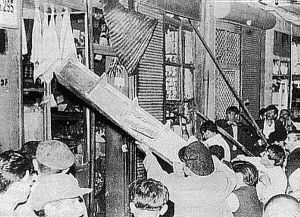Taksim (politics)

Taksim (Turkish for "division") was the objective of Turkish Cypriots who supported a partition of the island of Cyprus into Turkish and Greek portions, a concept declared as early as 1957 by Dr. Fazıl Küçük.[1]
Development of taksim
Turkish nationalism in Cyprus developed mainly in response to Greek nationalism and desire for enosis, union with Greece.[2][3][4] Initially, the Turkish Cypriots favoured the continuation of the British rule.[5] However, they were alarmed by the Greek Cypriot calls for enosis as they saw the union of Crete with Greece, which led to the exodus of Cretan Turks, as a precedent to be avoided,[6][7] and they took a pro-partition stance in response to the militant activity of EOKA.[8] The Turkish Cypriots also viewed themselves as a distinct ethnic group of the island and believed in their having a separate right to self-determination from Greek Cypriots.[9] Meanwhile, in the 1950s, Turkish leader Adnan Menderes considered Cyprus an "extension of Anatolia", rejected the partition of Cyprus along ethnic lines and favoured the annexation of the whole island to Turkey. Nationalistic slogans centered on the idea that "Cyprus is Turkish", and the ruling party declared Cyprus to be a part of the Turkish homeland that was vital for its security. Upon realising the fact that the Turkish Cypriot population was only 20% of the islanders made annexation unfeasible, the national policy was changed to favour partition. The slogan "Partition or Death" was frequently used in Turkish Cypriot and Turkish protests, starting in the late 1950s and continuing throughout the 1960s. Although after the Zurich and London conferences, Turkey seemed both to accept the existence of the Cypriot state and to distance itself from its policy of favouring the partition of the island, the goal of the Turkish and Turkish Cypriot leaders remained that of creating an independent Turkish state in the northern part of the island.[10][11]
See also
References
- ^ "Internet Archive Wayback Machine". Web.archive.org. 2006-06-15. Archived from the original on June 15, 2006. Retrieved 2012-01-25.
{{cite web}}: Cite uses generic title (help); Unknown parameter|deadurl=ignored (|url-status=suggested) (help) - ^ Kyris, George (2016). The Europeanisation of Contested Statehood: The EU in Northern Cyprus. Routledge. pp. 30–1. ISBN 1317032748.
The rise of Turkish nationalism among the Turkish Cypriots can be largely seen as a response to the Greek Cypriot national "awakening" and campaign for union with Greece.
- ^ Kızılyürek, Niyazi (2003). "The politics of identity in the Turkish Cypriot communit : a response to the politics of denial?". Travaux de la Maison de l'Orient méditerranéen. 37 (1): 197–204.
The Turkish Cypriot nationalism developed mainly in reaction to the Greek Cypriot national desire for union with Greece.
- ^ Carter, Judy; Irani, Irani; Volkan, Vamık (2015). Regional and Ethnic Conflicts: Perspectives from the Front Lines. Routledge. p. 60. ISBN 1317344669.
- ^ Papadakis, Yiannis; Peristianis, Nicos; Welz, Gisela (July 18, 2006). Divided Cyprus: Modernity, History, and an Island in Conflict. Indiana University Press. p. 2. ISBN 9780253111913.
- ^ Isachenko, Daria (2012). The Making of Informal States: Statebuilding in Northern Cyprus and Transdniestria. Palgrave Macmillan. p. 37. ISBN 9780230392076.
- ^ Pericleous, Chrysostomos (2009). Cyprus Referendum: A Divided Island and the Challenge of the Annan Plan. I.B.Tauris. pp. 135–6. ISBN 9780857711939.
- ^ Mirbagheri, Farid (2009). Historical Dictionary of Cyprus. Scarecrow Press. p. xiv. ISBN 9780810862982.
Greek Cypriots engaged in a military campaign for enosis, union with Greece. Turkish Cypriots, in response, expressed their desire for taksim, partition of the island.
- ^ Diez, Thomas (2002). The European Union and the Cyprus Conflict: Modern Conflict, Postmodern Union. Manchester University Press. p. 83. ISBN 9780719060793.
- ^ Behlul (Behlul) Ozkan (Ozkan) (26 June 2012). From the Abode of Islam to the Turkish Vatan: The Making of a National Homeland in Turkey. Yale University Press. p. 199. ISBN 978-0-300-18351-1.
In line with the nationalist rhetoric that "Cyprus is Turkish", Menderes predicated his declaration upon the geographic proximity between Cyprus and Anatolia, thereby defining "Cyprus as an extension of Anatolia". It was striking that Menderes rejected partitioning the island into two ethnic states, a position that would define Turkey's foreign policy regarding Cyprus after 1957
- ^ G. Bellingeri; T. Kappler (2005). Cipro oggi. Casa editrice il Ponte. p. 27. ISBN 978-88-89465-07-3.
The educational and political mobilisation between 1948-1958, aiming at raising Turkish national consciousness, resulted in the involving Turkey as motherland in the Cyprus Question. From then on, Turkey, would work hand in hand with the Turkish Cypriot leadership and the British government to oppose the Greek Cypriot demand for Enosis and realise the partition of Cyprus, which meanwhile became the national policy.


